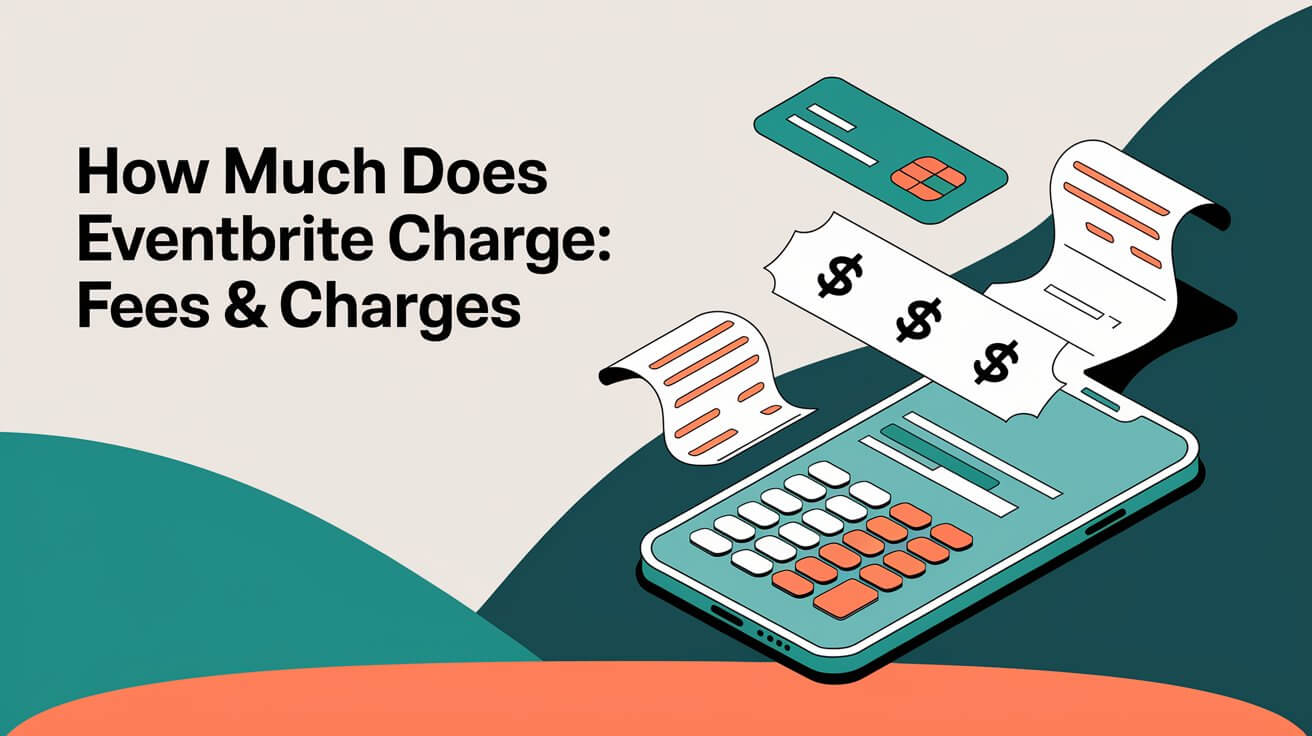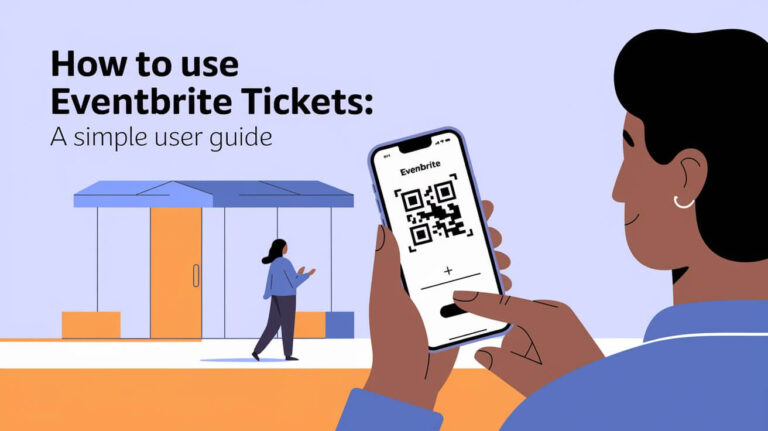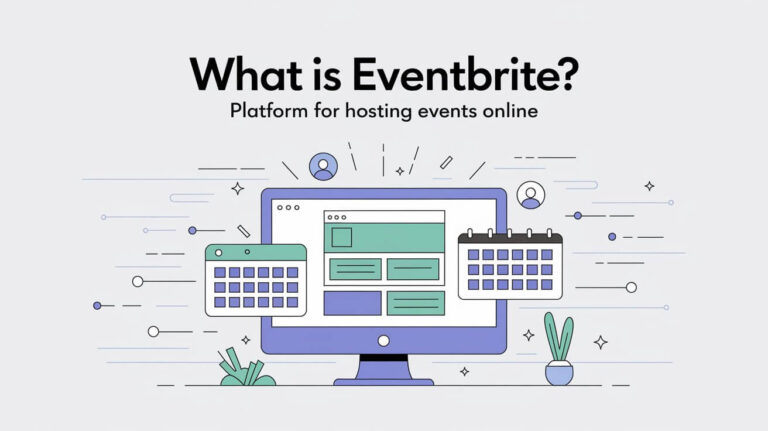
Eventbrite, a top event management and ticketing platform, has changed its pricing. Now, tickets cost $1.79 each. There’s also a 3.7% service fee and a 2.9% credit card fee. These changes mean you need to check the new prices to keep your event costs down.
The Pro plan costs between $15 and $100 a month. It has different email limits, helping big event planners with their marketing. With the Flex plan gone, hosts must think about their event needs and costs again. Eventbrite fees are key to managing these costs.
Eventbrite Fee Structure Basics
It’s key for event planners to know about Eventbrite’s fee structure. This helps them plan their budget and ticket prices better. The service fee is a big part of this, taking a percentage of the ticket price and adding a small fee per ticket. Eventbrite takes 3.7% of the ticket price plus $1.79 per ticket sold. They also charge 2.9% plus $0.30 for each payment transaction.
When looking at ticketing service charges and event management pricing, remember to include these fees. For example, on a $100 ticket, the organizer gets $85 after Eventbrite’s fees. Eventbrite’s total fee is about 15% of the ticket price. This can really cut into profits, more so for big events.
Service Fee Components
The service fee has two parts: a percentage of the ticket price and a small fee per ticket. This fee is added to each ticket sold. It changes based on the event and its location. It’s important to think about these fees when setting ticket prices to keep profits up.
Payment Processing Fees
Payment processing fees are charged for each transaction. They can change based on where you are and how you pay. These fees are usually a small percentage of the total transaction. Knowing these fees helps event planners set ticket prices right, ensuring they can manage their event management pricing well.
| Fee Type | Fee Amount |
|---|---|
| Service Fee | 3.7% of ticket price + $1.79 per ticket |
| Payment Processing Fee | 2.9% of total transaction amount |
Understanding Eventbrite’s fee structure, including ticketing service charges and event management pricing, helps event planners make smart choices. They can better plan their ticket prices and manage their revenue.
Free Event Creation Costs
Creating free events on Eventbrite is now easier. The platform lets you publish unlimited events for free. This is great for organizers of free events, as they don’t have to pay listing fees. Even though the event is free, there might be costs for things like materials or venue rental.
Starting September 1, 2023, there are no ticketing fees for free tickets. This makes it easier for organizers to manage free events. But, ticketing fees for paid tickets are the same unless the organizer pays for them. Eventbrite’s pricing is clear and fair, helping organizers save money.
Some benefits of using Eventbrite for free events include:
- No listing fees for free events
- No ticketing fees for free tickets
- Unlimited event publishing at no cost
- Competitive online event ticketing fees for paid events
Using Eventbrite for free events can save time and money. It’s a great choice for those who want to create and manage events without high costs. Eventbrite’s easy-to-use platform and fair prices make it perfect for free event organizers.
Paid Event Fee Breakdown
When you plan a paid event on Eventbrite, knowing the fee structure is key. It helps you manage costs and make money. Eventbrite takes a service fee and a payment processing fee for each ticket sold.
The service fee is a percentage of the ticket price plus a fixed fee per ticket. For instance, it’s 3.7% of the ticket price plus $1.79 per ticket. The payment processing fee is 2.9% of the total order. This fee covers the cost of processing payments.
Fee Components
The main fees for paid events on Eventbrite are:
- Service fee: 3.7% of ticket price + $1.79 per ticket sold
- Payment processing fee: 2.9% of the total order
- On-site payment fee: extra fee per ticket for on-site payments
International Transaction Fees
For international transactions, extra fees might apply. These fees can impact the cost per ticket. To cover expenses and make money, you need to consider these fees when setting ticket prices. Understanding these fees helps you make smart decisions about your event costs.
| Fee Type | Fee Amount |
|---|---|
| Service Fee | 3.7% of ticket price + $1.79 per ticket sold |
| Payment Processing Fee | 2.9% of the total order |
| On-site Payment Fee | extra fee per ticket for on-site payments |
Processing Time and Payout Schedule
Knowing the event payout schedule is key for event planners to manage money well. Eventbrite’s payout schedule lets organizers get their money a few weeks after the event. This is important because organizers need to know when they’ll get paid.
Usually, organizers get their money in 10 business days after the event ends. This time helps them plan their finances, pay for things, and get ready for more events. Eventbrite’s system makes sure payments are safe and fast. Knowing about the payout schedule and fees helps organizers plan better.
Here are some important things to remember about Eventbrite’s payout schedule and fees:
- Organizers get their money in 10 business days after the event ends
- The payout schedule is a few weeks, but it varies
- Fees are charged for each ticket sold
- It’s important to know about the payout schedule and fees for good event planning
Keeping these points in mind, organizers can manage their money well and succeed with their events. Whether you’re experienced or new, understanding Eventbrite’s payout and fees is vital for success.
Hidden Charges and Additional Expenses
When using Eventbrite, event organizers need to watch out for hidden fees and extra costs. These can include fees for refunds, currency exchange, and bank transfers. For example, Eventbrite charges 1-3% of the ticket price for refunds. Currency exchange can add up to 2.9% of the total order value.
Event organizers should also think about payment processing costs. These can be between 2.9% and 3.7% of the ticket price. Here are some estimated costs for using Eventbrite:
- Refund processing fees: 1-3% of the total ticket price
- Currency conversion rates: up to 2.9% of the total order value
- Bank transfer fees: variable, depending on the bank and location
- Payment processing fees: 2.9% to 3.7% of the ticket value
It’s key to include these hidden fees and extra costs in your event budget. Knowing about these costs helps you make better choices. This way, you can pick the best ticketing platform for your event.
| Eventbrite Plan | Estimated Costs |
|---|---|
| Essentials | 2% of sales + $0.79 per ticket |
| Professional | 3.5% of sales + $1.59 per ticket |
How Much Does Eventbrite Charge for Different Event Types
Eventbrite’s pricing can greatly affect the cost of hosting events. Knowing the pricing for different event types is key for organizers. For example, small, free events might cost little, while big, paid events can be more expensive due to higher ticket sales.
The cost of using Eventbrite changes based on the event type. A small event with low ticket prices might cost less, while a big festival with high prices could cost more. It’s important to think about pricing when picking an event management platform.
Here are some key points to consider when evaluating Eventbrite charges for different event types:
- Eventbrite charges a 2% online service fee plus $0.99 per ticket for paid events.
- The online service fee is capped at $7.95 per ticket.
- The payment processing fee is 3% of the ticket price for paid events.
To show how Eventbrite charges affect different events, let’s look at examples:
| Event Type | Ticket Price | Eventbrite Charges |
|---|---|---|
| Small Gathering | $10 | $0.99 + 2% of $10 = $1.29 |
| Large Festival | $100 | $7.95 + 3% of $100 = $10.95 |
Understanding Eventbrite’s pricing, organizers can make better choices for their events. This helps them find the most cost-effective solutions.
Fee Reduction Methods and Strategies
Event organizers can use several ways to cut down on Eventbrite fees. One method is to get bulk event discounts. This can save a lot of money if you’re hosting many events. Nonprofits also get a break, with a 50% discount on Eventbrite’s Pro plan.
Another way to lower fees is to look into premium partnerships. These partnerships can offer better deals for event planners. By talking to Eventbrite or looking at other platforms, you can save money and make more from your events. Some effective strategies include:
- Bulk event discounts for multiple events
- Premium partnerships for customized solutions
- Discounted rates for nonprofits on Eventbrite’s Pro plan
Using these strategies, event planners can cut costs and boost their earnings. This makes their events more successful and profitable. Options like bulk discounts, premium partnerships, and nonprofit rates help reduce Eventbrite fees and save money.
Platform Comparisons and Cost Benefits
Choosing the right event management platform is key. It’s important to look at costs and compare options. Eventbrite is well-known, but others like vFairs and Ticketmaster also have their own pricing and features. Doing a detailed comparison helps organizers find the best fit for their budget and needs.
Eventbrite charges 3.7% + $1.79 per ticket in the USA. On the other hand, vFairs doesn’t charge any fees for up to 500 attendees. This big price difference can really affect an event’s budget. Eventbrite’s easy-to-use interface and marketing tools are popular, but they also raise its cost.
Key Features and Pricing
Here are some important features and prices to think about:
- Eventbrite: 3.7% + $1.79 per ticket, with extra fees for payment
- vFairs: no fees for up to 500 attendees
- Ticketmaster: has flexible pricing and basic marketing tools
Looking at these points and the cost benefits of each platform, organizers can choose wisely. This ensures they get the best value for their money.
Final Thoughts
Understanding Eventbrite’s pricing is key for event organizers to succeed. They need to look at service fees, payment costs, and hidden charges. This helps them plan better and manage their budget well.
Whether it’s free events or ones that need tickets, knowing the fees helps. It lets organizers save money and make more profit. This is important for any event.
As event planning changes, keeping up with Eventbrite’s updates is vital. By finding ways to save money, like using discounts, organizers can do more with less. This means they can focus on making great experiences for everyone.
The secret to handling Eventbrite’s costs is to know the fees well. Use smart budgeting and watch your expenses closely. This way, event planners can succeed in the event world, making sure their events are both fun and financially sound.
Post FAQs & Solutions
What are the key changes in Eventbrite’s pricing structure?
Eventbrite has stopped its Flex plan. This plan let organizers pay per event based on ticket numbers. Now, the Pro plan has different tiers with email limits, starting at $15/month for up to 2,000 emails per day. This change helps large event organizers more, focusing on marketing.
What are the main components of Eventbrite’s fee structure?
Eventbrite’s fees include a service fee and a payment processing fee. The service fee is a percentage of the ticket price plus a fixed fee per ticket. For international transactions, there are extra fees, affecting the cost per ticket.
What are the costs associated with creating free events on Eventbrite?
Eventbrite now lets you publish unlimited free events for free. But, there might be costs for ticketing and payment processing if the event needs registration or has costs like materials or venue rental.
How are paid events charged on Eventbrite?
Paid events on Eventbrite have a service fee and a payment processing fee. The service fee is a percentage of the ticket price plus a fixed fee per ticket. The payment processing fee covers the cost of processing the payment.
What is the payout schedule for event organizers using Eventbrite?
Eventbrite’s payout schedule lets organizers get their money a few weeks after the event. Knowing this helps plan finances, cover expenses, and prepare for future events.
What are some additional charges and expenses that event organizers should be aware of?
Extra costs include refund processing fees, currency conversion rates for international transactions, and bank transfer fees for payouts. These can impact an event’s profitability.
How do Eventbrite’s fees vary for different event types?
Eventbrite’s costs change a lot based on the event type. Small, free events cost little, while large, paid events can have high fees due to more ticket sales and processing.
What strategies can event organizers use to reduce Eventbrite’s fees?
Organizers can look into nonprofit discounts, bulk event discounts, or premium partnerships to lower fees. Negotiating with Eventbrite or using other platforms can also cut costs.
How can event organizers compare Eventbrite’s pricing and features to other platforms?
When picking a platform, consider fees, features, and services. Comparing Eventbrite to competitors can show which offers the best value and functionality.






